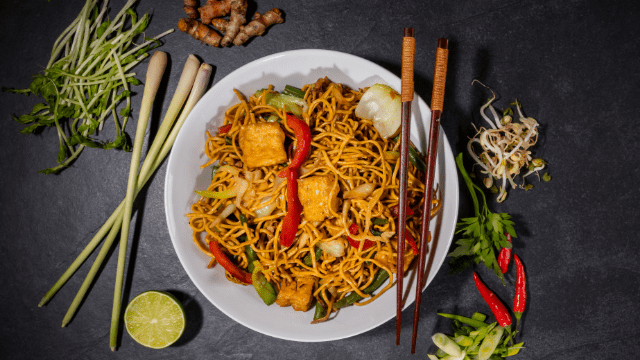👇 Take this lesson with you! 👇
Table of Contents
IELTS Speaking vocabulary: Food
Common Flavours and Tastes
Here are some common flavours and tastes
- Sour (plums)
- Sweet (carrots, mandarins)
- Juicy (oranges)
- Salty (anchovies)
- Savoury (anything that is not sweet)
- Peppery (flavour of black pepper)
- Pungent (cardamom)
- Spicy (Thai red curry)
Adjectives to Describe Food
This dish is ______
- delicious
- tasty
- luscious (= rich and sweet)
This dish looks_______
- mouth-watering
- tempting
- appetising
It tastes_____
- scrummy
- succulent (for meat, meaning juicy, tasty, tender = soft)
Tip: ‘Yummy’ – Don’t use this in IELTS, it is a word normally used by children!
- It’s perfect
- It’s spot on
- It’s top notch
- It’s nutritious
- It’s healthy

IELTS: Food for special occasions
- Weddings
- Birthdays
- Anniversaries
- National Holidays
- Religious festivals
- Party food (sausage rolls, pizza, cakes)
- Finger food (open sandwiches, tapas, vol au vents, crisps…)
- A National dish (fish ’n’ chips – in the UK)
- A Signature dish (a dish you like to make and are ‘famous’ for)
An old family favourite of mine is ________ A classic for birthdays is _______Templates for food on special occasions On birthdays, anniversaries _____
… we tend to eat … … we often eat … … we typically eat …At weddings, Christmas, Easter ____
… we usually to eat … … we will often eat … … we like to eat …
Tip: If you are not sure about which preposition to use for different occasions, then use FOR! (It works for all occasions.)
… we tend to eat … … we often eat … … we typically eat …
If the name of the dish is not an English word, or may not be commonly known, I suggest you also give a short explanation of the dish.

For example,
In my country for birthdays, we often eat ‘Migoreng’ which is a local dish consisting mainly of fried noodles eat …
Find out about other popular dished for special occasions in different parts of the world here:
https://www.betterhealth.vic.gov.au/health/healthyliving/food-and-celebrations
It is very common for people to spend a lot of money on food for special occasions. Here are some useful expressions to talk about that idea.
We forked out more than we should
I forked out a fortune just on drinks.
To fork out (on) = to spend a lot of money on something
We paid over the odds for that meal
To pay over the odds (for) = to pay too much
We spent a fortune on pricy beverages
To spend a fortune on something = to spend a lot of money
We paid through the nose for the catering for this event.
To pay through the nose (for) = to pay a lot / too much
Eating habits
Eating habits vary from family to family. In some areas, eating with the family together is really important. For others, just filling up and moving on to do something else is the goal.
Here are some phrases connected to different ways of eating.
- Binge eating
I am a binge eater
I am guilty of binge-eating
This means I eat lots of food in one go, and often I cannot stop. In extreme cases, this can be a medical condition.
- To have an eating disorder (a medical condition e.g anorexia)
- Snacking = when you enjoy eating small amounts of food frequently (this word normally has a negative connotation)
- Comfort eating = eating to feel good, e.g. eating a chocolate cake
My child is a fussy eater or a picky eater
This means they only eat the food they like and won’t try new foods
- To go on a diet = to restrict the intake of a certain kind of food

IELTS question and answers on food
Have you ever been on a diet?
- Yes, I have actually been on a low-carb diet for a few months.
- I follow the Keto diet
- I am following the mediterranean diet at the moment
- I am a vegetarian, but I consider that a lifestyle, not a diet
- I have been a vegan for years now.
- Yes, but not always, I like to have a cheat day once a week.
- No, I prefer to eat everything, but I eat in moderation.
- I wouldn’t say I am on a diet, but I do try to eat the rainbow, and eat a healthy diet.
IELTS listening task: Food
Watch this short video where Keith talks about people who like to get everyone around a table to eat together.
Listen and answer the following questions
- Who likes to get people around the table to eat?
- Why?
Click arrow to open/close answers
1. My mother
2. She saw it a socialising event and a catch up with friends and family.
Useful collocations
- A socialising / social event
- It’s a chance to….
- Catch up with others
- Having a chinwag (UK) = have a chit chat / conversation
- Eating is stuffing your face
- It’s different courses for different horses = different people like different things
Idioms to talk about food
The proof is in the pudding = you can only know if something is good by testing or experiencing it
I am not sure whether I should visit Korea or not. Well I guess there is only one way to find out, the proof is in the pudding.
To pig out (on) = to eat too much of something
I feel too full, I have just pigged out on too much fast food at KFC
To have a sweet tooth = to like sweet stuff
I can’t resist chocolate, you know I have a sweet tooth
It melts in the mouth = delicious
This steak is so tender and delicious, it just melts in the mouth
It’s the best thing since sliced bread = the best thing ever
This meal is the best thing since sliced bread
To eat like a horse = to eat a lot
After I get home from school, I am so hungry, I eat like a horse
To discover lots more idioms that use food, check out the link below
https://examples.yourdictionary.com/examples-of-food-idioms.html
More Free Lessons
If you liked this lesson, leave a comment below!
There are more lessons you can follow in the links below too.
INTELLIGENCE in IELTS Speaking. Learn different kinds of intelligence and some useful phrases.
SHOPPING in IELTS Speaking Learn the essential vocabulary for this topic, as well as how to talk about online shopping.
MONEY in IELTS Speaking Learn how to talk about earning, saving and spending money.

